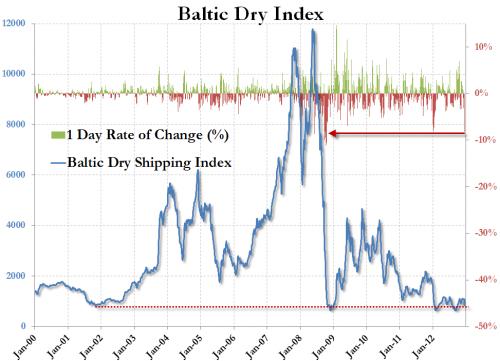

| Visitors Now: | |
| Total Visits: | |
| Total Stories: |
Baltic Dry Plunges By Over 8% Overnight, Most Since 2008
Wednesday, December 12, 2012 12:44
% of readers think this story is Fact. Add your two cents.
Baltic Dry
Plunges By Over 8% Overnight, Most Since 2008
Plunges By Over 8% Overnight, Most Since 2008
The BDI is
termed a leading economic indicator because it predicts future economic
activity
termed a leading economic indicator because it predicts future economic
activity
Submitted
by Tyler Durden on
12/12/2012 08:34
by Tyler Durden on
12/12/2012 08:34
It has been a
while since we looked at the Baltic Dry Index*, which when normalizing for the
excess glut in dry container ship supply (such as right now – 5 years after all
the excess supply in the industry – has long been normalized), continues to be
one of the best concurrent indicators of global shipping and trade.
while since we looked at the Baltic Dry Index*, which when normalizing for the
excess glut in dry container ship supply (such as right now – 5 years after all
the excess supply in the industry – has long been normalized), continues to be
one of the best concurrent indicators of global shipping and trade.
We look at it
today, moments ago it just posted an epic 8.2% plunge, crashing from 900 to
826, or the biggest drop since 2008! Of course, considering the collapse in
global trade confirmed in past days by both Chinese and US data, this should
not come as a surprise, although we are certain it will merely bring out the
BDIY apologists who tell us that supply and demand here (like in every other
Fed-supported market) are completely uncorrelated.
today, moments ago it just posted an epic 8.2% plunge, crashing from 900 to
826, or the biggest drop since 2008! Of course, considering the collapse in
global trade confirmed in past days by both Chinese and US data, this should
not come as a surprise, although we are certain it will merely bring out the
BDIY apologists who tell us that supply and demand here (like in every other
Fed-supported market) are completely uncorrelated.
*The Baltic Dry Index (BDI) is a number issued daily
by the London-based Baltic
Exchange. Not restricted to Baltic Sea
countries, the index provides “an assessment of the price of moving the
major raw materials by sea. Taking in 23 shipping routes measured on a
time-charter basis, the index covers Handysize, Supramax, Panamax, and Capesize dry bulk
carriers carrying a range of commodities including coal, iron ore and grain.”[1]
by the London-based Baltic
Exchange. Not restricted to Baltic Sea
countries, the index provides “an assessment of the price of moving the
major raw materials by sea. Taking in 23 shipping routes measured on a
time-charter basis, the index covers Handysize, Supramax, Panamax, and Capesize dry bulk
carriers carrying a range of commodities including coal, iron ore and grain.”[1]
Why economists
and stock market investors read it
and stock market investors read it
Most directly,
the index measures the demand for shipping capacity versus the supply of dry bulk
carriers. The demand for shipping varies with the amount of cargo that is
being traded or moved in various markets (supply
and demand).
the index measures the demand for shipping capacity versus the supply of dry bulk
carriers. The demand for shipping varies with the amount of cargo that is
being traded or moved in various markets (supply
and demand).
The supply of
cargo ships is generally both tight and inelastic—it takes two years to build a new
ship, and ships are too expensive to take out of circulation the way airlines
park unneeded jets in deserts. So, marginal increases in demand can push the
index higher quickly, and marginal demand decreases can cause the index to fall
rapidly. e.g. “if you have 100 ships competing for 99 cargoes, rates go
down, whereas if you’ve 99 ships competing for 100 cargoes, rates go up. In
other words, small fleet changes and logistical matters can crash
rates…”[5]
The index indirectly measures global supply and demand for the commodities
shipped aboard dry bulk carriers, such as building materials, coal, metallic ores, and grains.
cargo ships is generally both tight and inelastic—it takes two years to build a new
ship, and ships are too expensive to take out of circulation the way airlines
park unneeded jets in deserts. So, marginal increases in demand can push the
index higher quickly, and marginal demand decreases can cause the index to fall
rapidly. e.g. “if you have 100 ships competing for 99 cargoes, rates go
down, whereas if you’ve 99 ships competing for 100 cargoes, rates go up. In
other words, small fleet changes and logistical matters can crash
rates…”[5]
The index indirectly measures global supply and demand for the commodities
shipped aboard dry bulk carriers, such as building materials, coal, metallic ores, and grains.
Because dry bulk
primarily consists of materials that function as raw
material inputs to the production of intermediate or finished
goods, such as concrete, electricity, steel, and food, the index is also seen as an efficient economic indicator of future economic growth and
production. The BDI is termed a leading economic indicator because it
predicts future economic activity.[6]
primarily consists of materials that function as raw
material inputs to the production of intermediate or finished
goods, such as concrete, electricity, steel, and food, the index is also seen as an efficient economic indicator of future economic growth and
production. The BDI is termed a leading economic indicator because it
predicts future economic activity.[6]
Another index,
the HARPEX,
focuses on containers freight. It provides an insight on the transport of a
much wider base of commercial goods than commodities alone.
the HARPEX,
focuses on containers freight. It provides an insight on the transport of a
much wider base of commercial goods than commodities alone.
Other leading
economic indicators—which serve as the foundation of important political and
economic decisions—are often measured to serve narrow interests, and subjected
to adjustments or revisions. Payroll or employment numbers are often estimates;
consumer confidence appears to measure nothing more than sentiment, often with
no link to actual consumer behavior; gross national product figures are
consistently revised, and so forth. Unlike stock and bond markets, the BDI
“is totally devoid of speculative content,” says Howard Simons, an
economist and columnist at TheStreet.com. “People don’t book freighters
unless they have cargo to move.”[7]
economic indicators—which serve as the foundation of important political and
economic decisions—are often measured to serve narrow interests, and subjected
to adjustments or revisions. Payroll or employment numbers are often estimates;
consumer confidence appears to measure nothing more than sentiment, often with
no link to actual consumer behavior; gross national product figures are
consistently revised, and so forth. Unlike stock and bond markets, the BDI
“is totally devoid of speculative content,” says Howard Simons, an
economist and columnist at TheStreet.com. “People don’t book freighters
unless they have cargo to move.”[7]
NESARA- Restore America – Galactic News
2012-12-12 12:21:39
Source: http://nesaranews.blogspot.com/2012/12/baltic-dry-plunges-by-over-8-overnight.html
Source:




